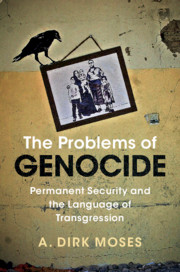Book contents
- The Problems of Genocide
- Human Rights in History
- The Problems of Genocide
- Copyright page
- Contents
- Preface
- Introduction
- Part I The Language of Transgression
- 1 The Language of Transgression, 1500s to 1890s
- 2 The Language of Transgression, 1890s to 1930s
- 3 Raphael Lemkin and the Protection of Small Nations
- 4 The Many Types of Destruction
- 5 Inventing Genocide in the 1940s
- Part II Permanent Security
- Part III The Language of Transgression, Permanent Security, and Holocaust Memory
- Index
4 - The Many Types of Destruction
from Part I - The Language of Transgression
Published online by Cambridge University Press: 07 January 2021
- The Problems of Genocide
- Human Rights in History
- The Problems of Genocide
- Copyright page
- Contents
- Preface
- Introduction
- Part I The Language of Transgression
- 1 The Language of Transgression, 1500s to 1890s
- 2 The Language of Transgression, 1890s to 1930s
- 3 Raphael Lemkin and the Protection of Small Nations
- 4 The Many Types of Destruction
- 5 Inventing Genocide in the 1940s
- Part II Permanent Security
- Part III The Language of Transgression, Permanent Security, and Holocaust Memory
- Index
Summary
The academic and popular fixation on Raphael Lemkin confuses biography with historical explanation of the genocide concept. An actual intellectual history of genocide needs to attend to his context rather than rely on his misleading autobiography, Totally Unofficial. His conception of humanity as comprising distinct nationalities did not originate in the liberal cosmopolitanism he postulated upon arriving in the USA, but in a lifelong Zionist commitment to Jewish statehood in Palestine. Similarly, Lemkin couched his appeal to end genocide not in terms of abstract human rights, let alone crimes against humanity, but in relation to an ideal of world civilization whose constituent parts were national, religious, and racial groups. His fixation on such groups and “small nations” led him to ignore the category of “the civilian” and other forms of civilian destruction, such as interwar debate about aerial bombing on cities. In doing so, he contributed to the depoliticization of the language of transgression.
- Type
- Chapter
- Information
- The Problems of GenocidePermanent Security and the Language of Transgression, pp. 169 - 200Publisher: Cambridge University PressPrint publication year: 2021

